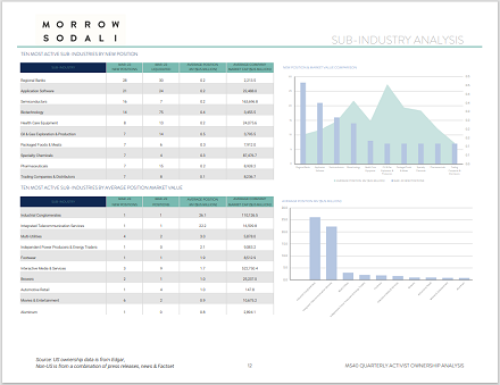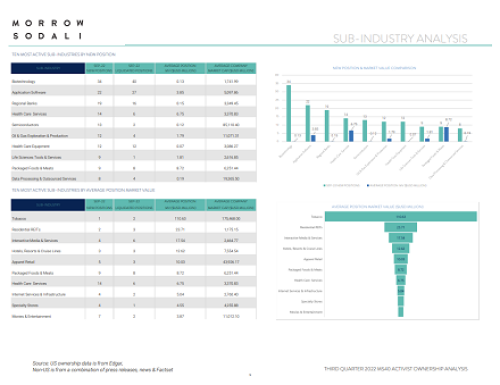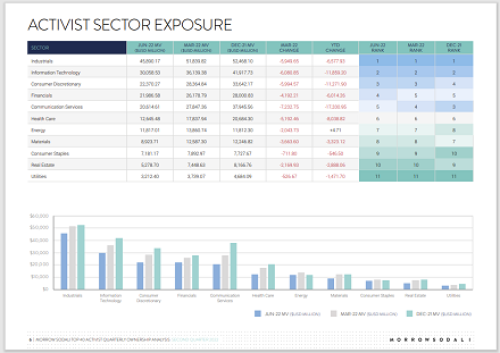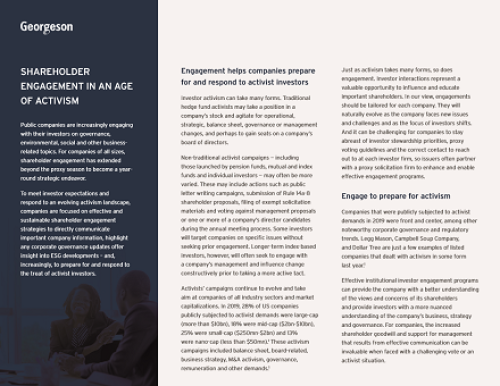Shareholder activism in Canada is evolving and becoming more sophisticated. While down in terms of volume, it has ‘grown in prominence, scale and momentum,’ according to Laurel Hill’s fifth annual Trends in Corporate Governance report.
So far in 2019, 44 companies have been subject to activist demands in Canada, compared with 69 in all of last year.
‘When people think of activism, they generally think of board battles,’ says David Salmon, president at Laurel Hill. ‘[Board battles] are decreasing because of things like reputational damage, cost and evolving governance standards. But by no means is activism dead – it’s taking on other types of considerations.’
These considerations include mini-tender offers, in which shareholders attempt to block deals; public broadcasting exemptions (PBEs), where shareholders can issue press releases outlining their opposition to board members and their intentions to publicly campaign against their election; and circulars issued in opposition to deals.
Salmon says the PBE is one of the more powerful and cost-effective tools activists can use in order to get their views in front of boards. ‘A PBE allows investors to issue a press release outlining that they will solicit against a certain issuer,’ he explains. ‘In terms of a majority voting concept, a shareholder can put out that it opposes you as a board member and actively solicit against your election. It is cheap – all you have to do is issue a press release. You can then contact Reuters or Bloomberg to express why you oppose that board member. A board member has to resign from a board if he or she doesn’t get that 50 percent plus one vote. That can give you a lot of sway in how the board is going to be constructed.’
Dissident shareholders have been winning their battles with increasing frequency. This hit a high point in 2017, when 73 percent of dissidents won board fights, up from 25 percent in 2016. It dipped to 50 percent last year and has increased to 63 percent year to date.
This has coincided with an uptick in dissident support from proxy advisory firms. According to the report, ISS and Glass Lewis supported dissident board nominees nearly 50 percent of the time year to date. That’s up from about one third last year and around 10 percent in 2017.
Salmon says proxy advisers have been more supportive of dissidents because activist investors are better prepared than in the past. ‘Many activists have impressive nominees to support their rationale for change. Consequently, the proxy advisers recognize that a diverse board will lead to better results,’ he says.
Shareholder proposals have nearly doubled, from 27 last year to 53 year to date. Salmon says issues like ESG, executive compensation and board accountability are driving this year’s proposals and are likely to continue to drive proposals in the future. ESG, in particular, will be challenging for Canadian companies to address.
‘We’re in the early stages of fully understanding what ESG is,’ Salmon says. ‘There is a disconnect between what is being disclosed and what shareholders are looking for. Until we get more consistent types of disclosure, we are going to see this as a big issue.’
Another big issue boards and shareholders are going to have to grapple with is diversity. Newly passed guidelines for companies under the Canadian Business Corporations Act require Canadian companies to consider four factors when it comes to ensuring diversity in their business: gender, disability, whether a person is a member of an indigenous people and whether a person is a visible member of a minority group.
‘It’s become more than a gender issue,’ Salmon says. ‘Boards have to make sure they have diverse people with diverse thoughts.’










